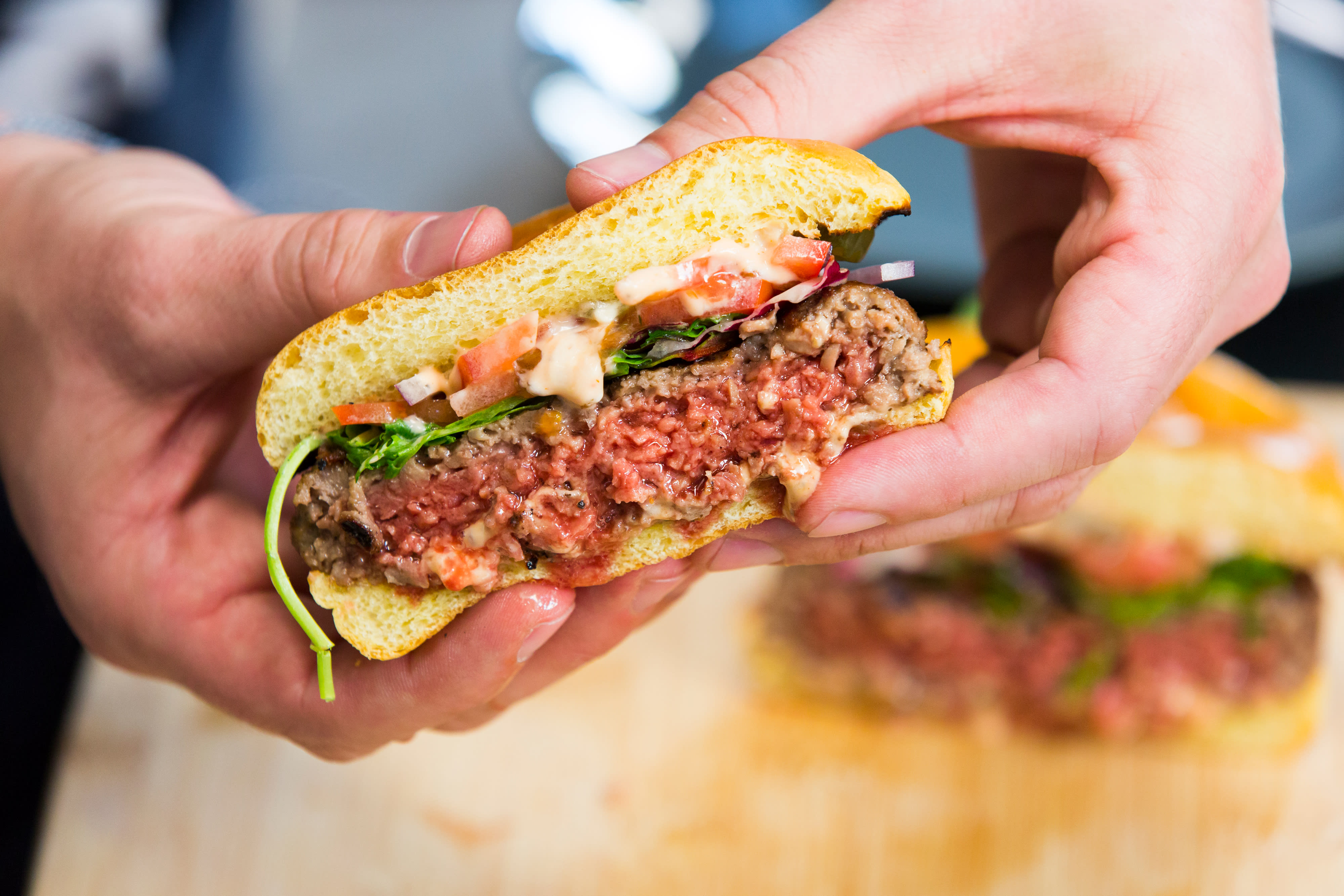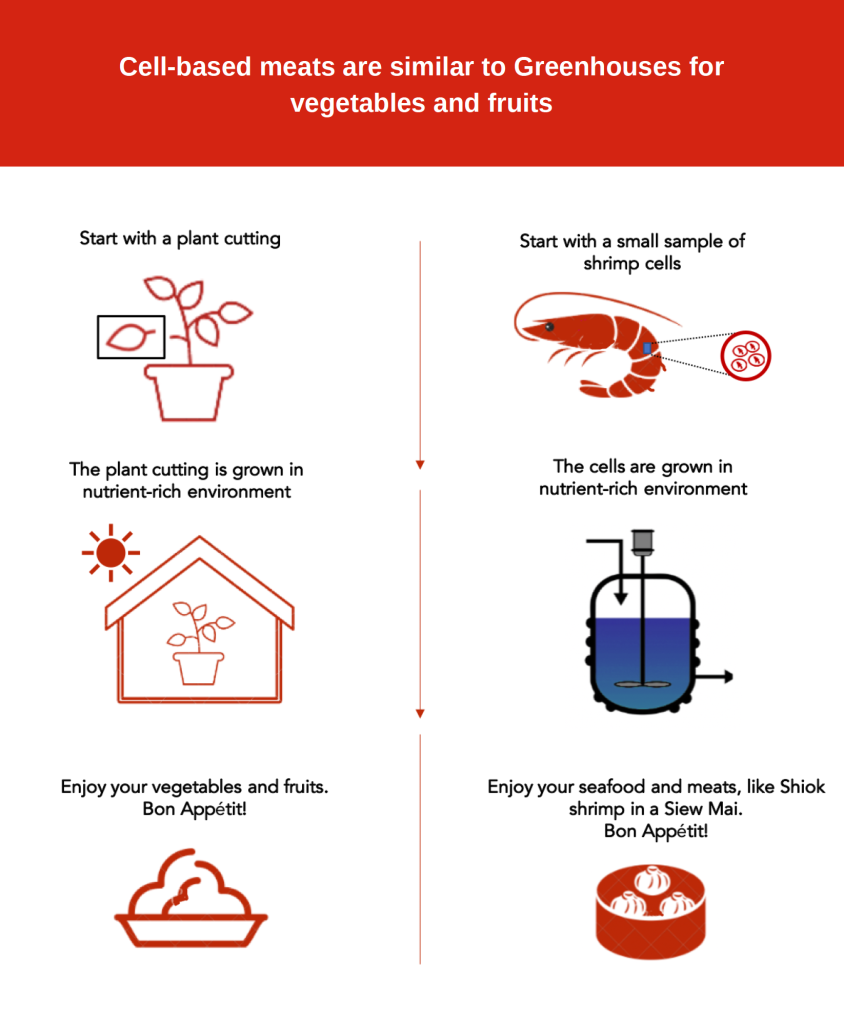Fill Me In
Staving off meat as a means of trying to reduce animal agriculture is undoubtedly something that takes immense self-control. Not to mention, the occasional restaurant menu with the giant “Impossible” sticker stuck on it may be off-putting.

Not everyone wants to pay an upscale price for beef that many swear tastes exactly like the real deal, although a meat lover might say it really doesn’t. It even bleeds. But it looks like local startup Shiok Meats may just have devised the perfect solution.
Enter lab-grown meat
We’re talking beef, chicken, shrimp, and foie gras, all sustainably made. The word “made” is where the secret to Shiok Meats’ sustainable food lies. Shiok Meats may be the first company in the world to sell lab-grown meat, in a race against many other companies looking to fill the “edible space race” gap. Who will emerge victorious in their attempts at creating the best “frankenmeats”?
The coming of the Frankenmeat
The first lab-grown meat that could ever go on sale may come from Shiok Meats, a “cell-based clean meat company” that hails itself to be the first of its kind from Southeast Asia.
Instead of harvesting meat from animals, the company works toward harvesting meat from the cells of animals, seemingly replicating the same taste, texture, and even adding nutrients without the need for any animal cruelty. If the company’s cellular replication is as accurate as it is made out to be, it would be hard to challenge the integrity of the meat they’ve produced as meat. It should taste and feel exactly the same, right?
Still in development
Global cell-based meat players seem to have varied offerings, including premium delicacies like bluefin tuna and foie gras, both of which are notoriously tied to cruel farming practices. Shiok Meats, on the other hand, has its sights set on more commonly enjoyed premium crustacean meats: shrimp, lobster, and crab. Shiok Meats is said to be the only company in a global landscape that’s recreating shrimp straight from cells.
The company are in the research & development stages of creating these meats and expects to commercialise in a few years. It looks like they’ve made some sizable progress, going as far as to test a food item with lab-made shrimp.
Shiok shrimp siew mai, anyone?
Well, Shiok Meats has definitely got our attention with their finished product — shrimp siew mai made with lab-grown shrimp. Mind you, we’re talking some gourmet-style intricately presented stuff, a far cry from the inexpensive siew mais from coffee shops that we all have soft spots for.
During the COVID-19 pandemic, Shiok Meats’ headquarters used their meat to craft a Cantonese dim-sum staple with yellow dumpling wrappers. The siew mai was reported to possess the texture of realistic ground shrimp. And while that sounds like a definite win for the company, they aren’t stopping there.
Sandhya Sriram, who initiated Shiok Meats, has her sights set on bowling consumers over with her aims of commercialising crab and lobster meat as well. She also wants to make a deshelled piece of shrimp so convincing that it could hang off the edge of a cocktail glass. If these are what you call “frankenmeats”, call us “the bride of frankenmeat”.
Let’s talk market-readiness
What’ll it take for lab-grown meats to become commercially viable? Apart from likeness to real meat needing to appeal to carnivorous palates, discerning health-conscious consumers will also rest better if the laboratory process is transparent to dispel fears of artificially-made organic structures being overly “processed”. Understandably, laboratories remain secretive about their working process in fear of their progress being stolen.
And on the grand scale of things, lab-grown meat also needs to be affordable enough to convince whole markets to make the switch and warrant the shutting down of livestock farms.
At the moment, a piece of siew mai costs Shiok Meats a whopping $300, definitely not a price that’s ready to meet the snapping jaws of world-defining consumerism. While Shiok Meats has already achieved scalability with its shrimp, only time will tell how fast the company will emerge as frontrunners in this food space.

Yes to environmental benefits
Whoever it is that comes out on top, there’s no denying the environmental benefits that lab-grown meats can have. Where veganism and increased farming of vegetation have proven to have their own negative environmental effects, replacing livestock with lab-grown meat could mean a reduction in at least 74% of emissions.
When the world is ready for lab-grown meats, the possibilities will be endless, and these will extend toward offering culinary experiences that are complex to attain by farming. Sometime in the future, you might know the taste of Wagyu mixed with other heritage beef lines could be like.
And as much as it might pain a meat-lover to admit this, we have companies like “Impossible” and “Beyond Meat” to thank for spurring the whopping investments that continue to go into the lab-made meat industry.
Join the conversations on THG’s Facebook and Instagram, and get the latest updates via Telegram.














